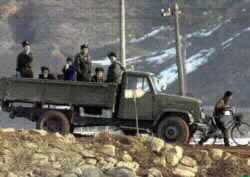North Korea said Monday it would win any nuclear war with the United States as the crisis over the communist state's suspected drive to manufacture atomic weapons entered the fifth month. South Korea weighed in with some rhetoric of its own. President Kim Dae-jung said North Korea should "not even dream of having nuclear weapons," calling it a dangerous development that could trigger an arms race. "If North Korea gets nuclear weapons, the stance of Japan and our country toward nukes would change," he said in a speech.
And the United States and South Korea detailed plans for war games on the tense peninsula in March and April -- a time when Washington could be at war in Iraq.
North Korean state media returned to saber-rattling after a weekend of reinforcing cult worship of reclusive leader Kim Jong-il. It was Kim's 61st birthday Sunday.
"Victory in a nuclear conflict will be ours and the red flag of army-first politics will flutter ever more vigorously," state radio said, reported by South Korea's Yonhap news agency.
"Our victory is certain and the future ever more radiant," it said, touting the dominance of the army in the world's most heavily militarized society.
The comments came as the United States, which keeps 37,000 troops in South Korea under a 50-year-old alliance, said annual bilateral military exercises will be held in the South in March and April.
The U.S. Forces Korea said the allies had informed the North about the war games.
The North's million-strong Korean People's Army is the world's fifth-largest and military spending accounts for as much as a quarter of the economically struggling country's gross domestic product. The North's population is 22.5 million people.
WARNINGS DAILY FARE
War warnings and claims the United States is poised to attack North Korea have been almost daily fare in Pyongyang's official media since the nuclear crisis flared up last year.
South Koreans have lived within range of forward-deployed North Korean artillery for years and have largely played down recent threats.
President Kim said he believed Washington was committed to a peaceful solution.
"I think that the United States will not take military action against North Korea. I see no possibility of that," Kim said in a speech at a luncheon. His comments were reported by the presidential office .
But the prolonged nuclear impasse has raised concerns about the South's economy as Kim prepares to hand power to President-elect Roh Moo-hyun on February 25. South Korea's central bank said Monday the South could miss its 2003 growth target if the crises over Iraq and North Korea dragged on.
"We will maintain a low interest rate policy...as our economy may fail to meet expectations if the uncertainty over war in Iraq and North Korea's suspected nuclear programs is prolonged," it said in a statement to parliament.
The standoff over North Korea's suspected nuclear program has been simmering since mid-October, when Washington said Pyongyang had admitted to pursuing a program to enrich uranium in violation of major international treaty commitments.
Since then, North Korea has expelled U.N. nuclear inspectors and withdrawn from the treaty that aims to curb the global spread of nuclear weapons and said it was ready to restart a mothballed reactor capable of producing plutonium for bombs.
Pyongyang has insisted that it only intends to produce electricity for its decrepit economy and that the nuclear row is a bilateral dispute with Washington that can only be resolved through two-way talks leading to a non-aggression treaty.
But a vote on February 12 by the International Atomic Energy Agency (IAEA), the U.N. nuclear watchdog, referring the nuclear issue to the Security Council, was seen as a rebuff to North Korea's insistence on a bilateral solution.
The Security Council has the power to impose economic sanctions -- a step North Korea has said would amount to a declaration of war.
But the IAEA says its members had no plan to push for sanctions now. North Korea's allies Russia and China and neighbors including South Korea are against sanctions.
The United States has said it has no intention of invading North Korea and is willing to talk to Pyongyang but not to negotiate any new nuclear deal.
PHOTO CAPTION
North Korean soldiers ride in the back of a truck at a village near Mount Kumgang, Sunday, Feb. 16, 2003. North Korea said Monday it will win the dispute with the United States over its nuclear development, praising the communist governments ultra-hardline military stance. (AP Photo/Kim Kyung-Hoon, Pool)
- Feb 17 4:18 AM E
- Author:
Reuters - Section:
WORLD HEADLINES


 Home
Home Discover Islam
Discover Islam Quran Recitations
Quran Recitations Lectures
Lectures
 Fatwa
Fatwa Articles
Articles Fiqh
Fiqh E-Books
E-Books Boys & Girls
Boys & Girls  Hajj Rulings
Hajj Rulings Hajj Fatwas
Hajj Fatwas














